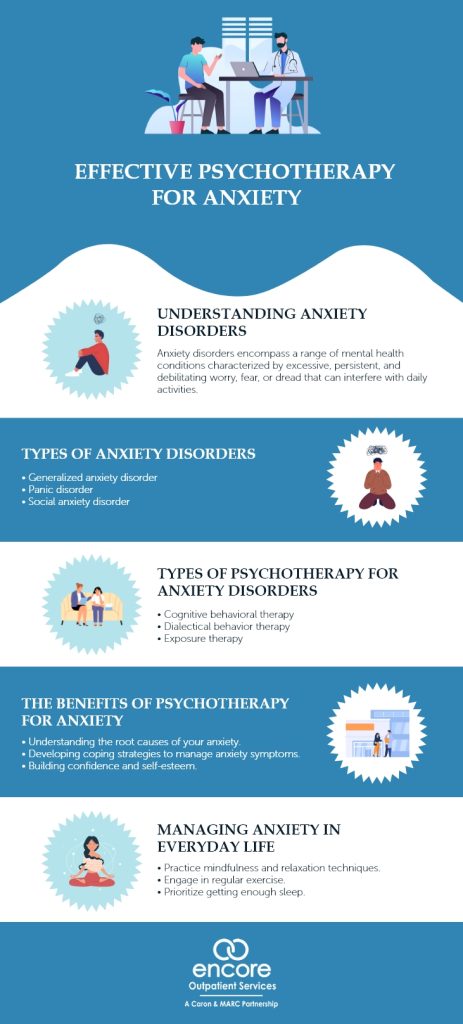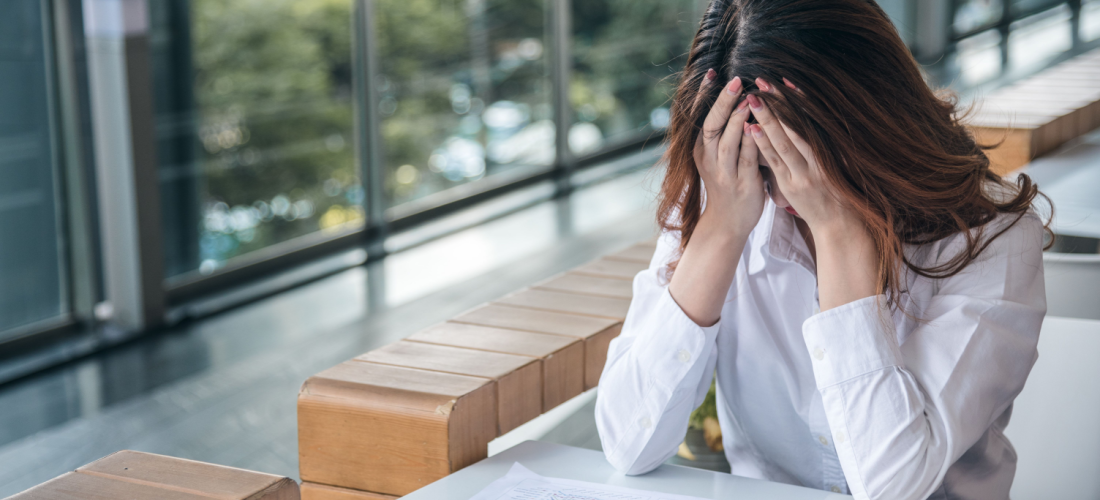Exploring Different Strategies in Counselling for Anxiousness Disorder for Long-term Change
When dealing with anxiousness problems, it's vital to discover a range of therapy techniques. Each method offers unique insights and tools to aid you handle your symptoms successfully. You may find that combining methods can produce the most effective outcomes. Nevertheless, recognizing the nuances of these approaches is essential to promoting long lasting adjustment. What happens if the right mix could release a new degree of emotional well-being for you?
Comprehending Stress And Anxiety Disorders: A Quick Overview
Stress and anxiety disorders, which influence numerous individuals worldwide, can significantly impact every day life. You might experience frustrating feelings of fear or worry that appear irrepressible. These feelings can lead to physical signs like an auto racing heart, sweating, or also wooziness. Usual sorts of stress and anxiety disorders include generalized stress and anxiety disorder, panic attack, and social anxiousness condition. Each has one-of-a-kind signs, yet they all share a propensity to disrupt your routine and relationships.Understanding the origin of your anxiety is essential. It might originate from genes, mind chemistry, or life experiences. Identifying your triggers can aid you handle your actions much better. It's crucial to bear in mind that you're not the only one in this struggle. Many individuals deal with similar challenges, and looking for help is a strong action toward sensation much better. By discovering anxiousness disorders, you're currently on the path to understanding and handling your problem better.
Cognitive-Behavioral Treatment: Testing Adverse Thought Patterns
In Cognitive-Behavioral Treatment, you'll start by determining the unfavorable idea sets off that add to your anxiousness. You'll work on replacing them with more favorable options when you identify these ideas. With each other, you'll develop efficient coping methods to help handle your stress and anxiety in daily situations.
Identifying Unfavorable Thought Triggers

When you encounter minutes of distress, acknowledging the certain triggers behind your unfavorable thoughts can be important in managing stress and anxiety. Begin by focusing on scenarios that provoke feelings of worry or worry. Is it a crowded room, an approaching target date, or a conversation with certain people? Jot down these circumstances in a journal. This will certainly assist you identify patterns in your thinking. Notification physical experiences that accompany your negative thoughts, like an auto racing heart or tightness in your upper body. By pinpointing these triggers, you acquire understanding right into what's fueling your anxiousness. Comprehending these connections is the primary step in testing those ideas and inevitably gaining back control over your psychological reactions.
Replacing Thoughts With Positives
Testing adverse thought patterns is an essential action in changing your frame of mind and lowering stress and anxiety. You may typically find on your own trapped in cycles of self-doubt or disastrous reasoning. As opposed to letting these thoughts determine your sensations, method replacing them with positive affirmations or sensible choices. When you think, "I can't handle this," shift it to, "I can manage difficulties one action at a time." This basic change can greatly impact your emotional state. On a regular basis determining and countering these adverse thoughts helps develop a healthier internal discussion. Remember, it takes time and effort, however regularly practicing this technique can result in enduring change, empowering you to deal with stress and anxiety with renewed confidence and resilience.
Building Coping Approaches With Each Other
Replacing unfavorable thoughts is only the start of handling stress and anxiety successfully. To produce lasting adjustment, you need to construct coping strategies that encourage you. Cognitive-Behavioral Therapy (CBT) aids you identify and challenge those purposeless idea patterns. With each other, you and your counselor can explore exactly how these thoughts influence your feelings and behaviors.Start by creating functional strategies, like journaling or mindfulness workouts, that permit you to face anxiousness head-on. When you face your fears gradually, you'll discover to react in different ways.

Mindfulness and Acceptance-Based Approaches: Growing Present-Moment Understanding
As you browse the complexities of anxiety, integrating mindfulness and acceptance-based methods can substantially boost your capacity to cultivate present-moment awareness. By concentrating on the below and now, you'll discover that you can observe your thoughts and feelings without judgment (Counseling services for anxiety). This technique assists you acknowledge your stress and anxiety without really feeling bewildered by it.Engaging in mindfulness workouts, such as deep breathing, body scans, or directed reflections, permits you to ground yourself in your present experience. Acceptance-based strategies urge you to welcome your feelings instead of deal with against them. When you approve your sensations, they shed their power over you.Incorporating these techniques into your day-to-day regimen can change exactly how you reply to anxiousness. You'll create strength and discover to navigate demanding situations with higher ease. Eventually, cultivating present-moment understanding lays the structure for long-term change, equipping you to lead an extra meeting life
Direct Exposure Treatment: Challenging Anxieties Progressively
Direct exposure treatment aids you challenge your concerns in a progressive means, making it much less overwhelming. You'll discover methods to face anxiety-provoking scenarios action by action, while also building coping strategies to handle your responses. This method equips you to take control and decrease anxiety gradually.
Steady Exposure Strategies

When dealing with stress and anxiety, gradually challenging your concerns can be a powerful way to regain control. This strategy, referred to as steady exposure, entails gradually subjecting yourself to the scenarios or things that cause your stress and anxiety. Beginning with less challenging circumstances and gradually function your way approximately even more challenging ones. For instance, if you hesitate of public speaking, you could begin by speaking in front of a mirror, then progress to sharing thoughts with a close friend, and eventually deal with a tiny group. Each action aids desensitize you to the anxiety, constructing your confidence with time. Remember, it's essential to rate on your own and celebrate small victories as you relocate with this read this post here procedure, strengthening your capability to handle anxiousness efficiently.
Structure Coping Methods
Building effective coping approaches is necessary for handling anxiousness, particularly as you face your worries gradually - Counseling services for anxiety. One effective method is exposure treatment, where you begin by facing your fears in a controlled fashion. Start with much less frightening situations and slowly work your method approximately even more tough circumstances. This progressive direct exposure helps desensitize you to anxiousness triggers, making them much less overwhelming.Incorporate leisure strategies, such as deep breathing or mindfulness, to relax your mind during direct exposure. Track your development, commemorating tiny victories along the road to improve your confidence. Bear in mind, it's fine to take your time; the objective isn't perfection however consistent improvement. By developing these strategies, you'll equip yourself to browse stress and anxiety and embrace life extra completely
Psychodynamic Therapy: Discovering Origin of Anxiousness
Psychodynamic treatment explores the subconscious mind, revealing the origin of your anxiousness. By examining your ideas, feelings, and past experiences, this approach aids you uncover underlying problems and unresolved concerns that may add to your present anxiety. You'll function with a specialist to explore childhood years experiences, partnerships, and emotional patterns that form your responses today.As you obtain insight into these much deeper layers of your subconscious, you'll begin to More Info identify how previous events influence your present behavior. This understanding can lead to catharsis, enabling you to process emotions you might have suppressed.Through the restorative partnership, you can additionally determine defense reaction that may have created gradually, supplying a clearer course to alter. Eventually, psychodynamic treatment outfits you with the devices to address your anxiety at its core, promoting long-term makeover in your emotional well-being.
Integrative and All Natural Approaches: Incorporating Techniques for Greater Effectiveness
Incorporating different restorative techniques can enhance your journey towards managing anxiety a lot more properly. By integrating aspects from cognitive-behavioral therapy, mindfulness methods, and alternative strategies, you can develop a personalized technique that resolves your distinct demands. As an example, you might use cognitive-behavioral methods to challenge adverse thought patterns while integrating mindfulness exercises to ground on your own in the here and now moment.Additionally, discovering alternative practices such as yoga or meditation can promote relaxation and minimize stress and anxiety signs and symptoms. This mix enables you to establish greater self-awareness and resilience.Experimenting with these diverse methods can assist you find what resonates most with you. Bear in mind, it's concerning finding a synergy that works, rather than staying with a single approach. This integrative strategy not just offers instant relief but also cultivates lasting abilities for managing stress and anxiety, equipping you to reclaim control over your life.
The Role of Assistance Solutions: Building Resilience Via Link
While it might seem that taking care of anxiety is a solitary journey, having a strong support group can play an essential role in your durability. Bordering yourself with empathetic close friends, family members, or support system produces a risk-free room where you can openly share your sensations and experiences. When you connect with others, you advise yourself that you're not the only one in this struggle.These connections use encouragement and can offer sensible coping methods that have actually helped others. It's also a chance to acquire perspective; close friends can aid you see scenarios in different ways, decreasing sensations of isolation.Moreover, psychological support promotes a feeling of belonging, which can greatly ease anxiety signs and symptoms. By leaning on your assistance system, you can construct durability and deal with difficulties more properly. Bear in mind, connecting for aid signifies stamina, and it can make all the difference in your trip toward managing anxiety.
Regularly Asked Concerns
What Are the Typical Signs And Symptoms of Anxiety Conditions?
You could experience restlessness, exhaustion, problem focusing, impatience, muscle mass tension, and sleep disruptions. Physical symptoms can consist of fast heart beat, sweating, and trembling. Acknowledging these signs early can assist you seek appropriate assistance and treatment.
Just How Long Does Therapy Generally Last for Anxiousness Disorders?
Therapy for anxiety conditions commonly lasts anywhere from a few weeks to several months. It actually depends on your specific needs, progress, and the strategies your therapist makes use of to assist you manage your anxiousness effectively.
Can Medication Be Used Along With Treatment for Anxiousness?
Yes, drug can most definitely be used along with therapy for stress and anxiety. Incorporating both strategies frequently improves treatment performance, aiding you manage signs and symptoms while discovering underlying concerns via counseling (Counseling services for anxiety). Constantly consult your doctor for tailored suggestions
Are There Self-Help Strategies for Taking Care Of Anxiousness?
Yes, there are a number of self-help methods for handling anxiousness. You can exercise mindfulness, involve in regular exercise, keep a balanced diet, establish a routine, and utilize deep breathing methods to help in reducing stress and anxiety symptoms properly.
How Do I Know if I Need Professional Assistance for Anxiousness?
